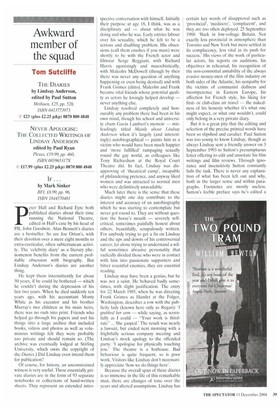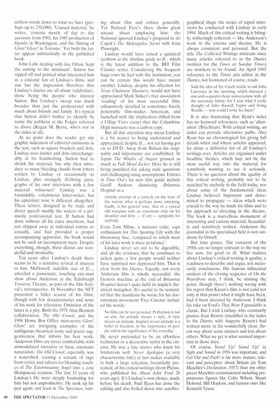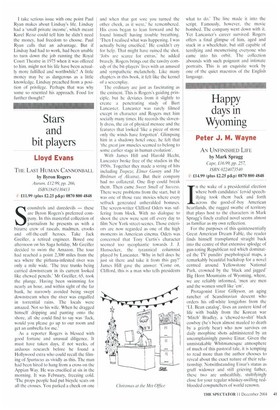Awkward member of the squad
Tom Sutcliffe
THE DIARIES by Lindsay Anderson, edited by Paul Sutton Methuen, £25, pp. 528, ISBN 0413773973 ct £23 (plus £2.25 p&p) 0870 800 4848 NEVER APOLOGISE: THE COLLECTED WRITINGS Of LINDSAY ANDERSON edited by Paul Ryan Plexus, £19.99, pp 460, ISBN 085965317X © £17.99 (plus £2.25 p&p) 0870 800 4848 IF . . .
by Mark Sinker BFI, £8.99, pp. 96, ISBN 1844570401 peter Hall and Richard Eyre both published diaries about their time running the National Theatre, edited in Hall's case by his head of PR, John Goodwin. Alan Bennett's diaries are a bestseller. So are Joe Orton's, with their devotion over a mere eight months to extra-curricular, often subterranean activity. The 'celebrity diary' as a literary phenomenon benefits from the current profitable obsession with biography. But Lindsay Anderson's diaries are another thing.
He kept them intermittently for about 50 years, if he could be bothered — which he couldn't during the depression of his last two years. When he died suddenly ten years ago, with his accountant Monty White as his executor and his brother Murray's two children as his main heirs, there was no rush into print. Friends who helped go through his papers and sort his things into a large archive that included books, videos and photos as well as voluminous writings felt they were probably too private and should remain so. (The archive was eventually lodged at Stirling University, which owns the copyright of the Diaries.) Did Lindsay even intend them for publication?
Of course, for history, an unconstrained witness is very useful. These essentially private diaries are in the form of 93 separate notebooks or collections of hand-written sheets. They represent an extended intro
spective conversation with himself. Initially their purpose at age 18, I think, was as a disciplinary aid — about what he was doing and who he was. Early entries labour over his sexuality, which he felt to be a serious and disabling problem. His obsessions (call them crushes if you must) were shortly to be with the French actor and filmstar Serge Reggiani, with Richard Harris agonisingly and masochistically, with Malcolm McDowell (though by then there was never any question of anything happening or even being desired) and with Frank Grimes (ditto). Malcolm and Frank became vital friends whose potential quality as actors he lovingly helped develop — never anything else.
Lindsay resolved completely and honourably any problem there had been in his own mind, though his school and university chum Gavin Lambert's memoir — misleadingly titled Mainly about Lindsay Anderson when it's largely (and interestingly) autobiographical — paints him as a victim who would have been much happier and 'more fulfilled' rampaging sexually round the gay world, as colleagues like Tony Richardson at the Royal Court Theatre did. In fact, Lindsay was disapproving of 'theatrical camp', incapable of philandering pretence, and anyway liked women and was attracted to normal men who were definitively unavailable.
Much later there is the sense that these diaries might one day contribute to the interest and accuracy of an autobiography which he was starting to contemplate but never got round to. They are without question the horse's mouth — severely selfcritical, sometimes painfully honest about others, beautifully, scrupulously written. For anybody trying to get a fix on Lindsay and the ups and downs of his controversial career, let alone trying to understand a wilful sometimes abrasive personality that radically divided those who were in contact with him into passionate supporters and bitter resentful enemies, they are essential reading.
Lindsay may have been a genius, but he was not a saint. He behaved badly sometimes, with slight justification. The entry for 22 March 1985, when he was directing Frank Grimes as Hamlet at the Folger, Washington, describes a row with the publicity lady (known here only as Regan): 'I grabbed her arm — while saying, as scornfully as I could — "Your work is thirdrate" ... She gasped.' The result was nearly a lawsuit, but ended next morning with a frightfully serious company meeting and Lindsay's mock apology to the offended party: 'I apologise for physically touching you.' The theatre is a hothouse. Bad behaviour is quite frequent, so is poor work. Visitors like Lindsay don't necessarily appreciate 'how we do things here'.
Because the overall span of these diaries is so immense in the life of this remarkable man, there are changes of tone over the years and altered assumptions. Lindsay has certain key words of disapproval such as 'provincial', 'mediocre', 'complacent', and they are too often deployed. 25 September 1988: 'Back in low-voltage Britain. Not exactly less provincial in atmosphere than Toronto and New York but more settled in its complacency, less vital in its push for success.' His views of the work of particular actors, his reports on auditions, his objectives in rehearsal, his recognition of the non-committal amiability of the always evasive money-men of the film industry on both sides of the Atlantic, his sympathy for the victims of communist dullness and incompetence in Eastern Europe, his affection for French style, his liking for firstor club-class air travel — the nakedness of his honesty whether it's what one might expect, or what one wouldn't, could only belong in a very private diary.
But it is a great pity that the editing and selection of the precise printed words have been so slipshod and cavalier. Paul Sutton was too young to know Lindsay, though as always Lindsay sent a friendly answer on 3 September 1993 to Sutton's presumptuous letter offering to edit and annotate his film writings and film reviews. Through ignorance and insensitivity Sutton constantly fails the task. There is never any explanation of what has been left out and why, both in the larger sense and within paragraphs. Footnotes are mostly useless. Sutton's feeble preface says he's edited a
million words down to what we have (perhaps up to 250,000). 'Unused material,' he writes, 'consists mostly of day to day accounts from 1965, his 1985 production of Hamlet in Washington, and the filming of Glory! Glory! in Toronto.' Yet both the latter appear substantially in the published book.
John Lahr dealing with Joe Orton 'kept the cutting to the minimum'. Sutton has ripped off and printed what interested him as a cineaste fan of Lindsay's films, and one has the impression therefore that Lindsay's diaries are all about 'celebrities', those being the people who interest Sutton. But Lindsay's sweep was much broader than just the professional with much about friends and family. It's typical that Sutton didn't bother to identify by name the publicist at the Folger referred to above (Regan M. Byrne, who's not in the index at all).
At no point does the reader get any graphic indication of editorial omissions in the text, such as square brackets and dots. Lindsay uses dashes and dots interchangeably in his handwriting. Sutton had to shrink the material, but why then introduce so many bleeding chunks from letters written by Lindsay or occasionally to Lindsay, plus strangely ill-fitting paragraphs of his own interviews with a few material witnesses? Lindsay was a formidable, voluminous letter-writer, but his epistolary tone is different altogether. These letters, designed to be read, and direct speech muddy the waters of a primarily confessional text. If Sutton had done without all his extra insertions, had not chipped away at individual entries so casually, and had provided a proper accompanying apparatus, the book would not be such an incompetent mess. Despite everything, though, these diaries are wonderful and invaluable.
Ten years after Lindsay's death there seems to be a tentative revival of interest in him. McDowell, indelible star of If..., unveiled a passionate, touching one-man show about Anderson at the Edinburgh Traverse Theatre, as part of the film festival's retrospective. In November the NET presented a fuller season of his films, though with few documentaries and none of his work for television. Omission of the latter is a pity. Both his 1978 Alan Bennett collaboration, The Old Crowd, and the 1988 Home Box Office mini-series Glory! Gloty! are intriguing examples of the ambiguous theatrical irony and poetic suggestiveness that inform his best work. Anderson films are never comfortable with unmodulated narrative or basic cinematic naturalism. The Old Crowd, especially, was a watershed, earning a scream of rage from critics and editors for blending touches of The Exterminating Angel into a cosy Hampstead reunion. The last 15 years of Lindsay's life were deeply frustrating for him but not unproductive. He took up his pen again, not least in The Spectator, writ ing about film and culture generally. Yet Richard Eyre's Diary shows great unease about employing him: the National ignored Lindsay's proposal to do Capek's The Makropulos Secret with Joan Plowright, Lindsay would have raised a quizzical eyebrow at the slimline guide to If.. which is the latest addition to the BFI Film Classics series. Considering the frequent huge rows he had with the institution, you can be certain this would have meant another. Lindsay, despite his affection for Texas Chainsaw Massacre, would not have appreciated Mark Sinker's free association 'reading' of his most successful film, exhaustively detailed in sometimes barely penetrable film-studies American, and launched with the implication (lifted from a Village Voice essay) that the Columbine High massacre was a carbon copy.
But all this attention may mean Lindsay is a bit nearer to being understood and appreciated, despite If... not yet having got on to DVD. Away from Britain his originality and importance are established. In Japan The Whales of August grossed as much as Full Metal Jacket, Here he is still being punished for asking rude questions and challenging smug assumptions. Entries in Time Out's fat new film guide include Geoff Andrew dismissing Britannia Hospital as a
vitriolic attempt at a comedy on the state of the nation; what is perhaps more annoying, finally, is his general tone, that of a cynical old sourpuss with an enormous chip on his shoulder and little — if any — sympathy for anybody.
Even Tom Milne, a maturer critic, caps enthusiasm for This Sporting Life with the throwaway line, 'compared to which most of his later work is mere petulance'.
Lindsay never set out to be digestible, and all the evidence that he continues to sicken quite a few people would neither have surprised nor depressed him. That is clear from the Diaries. Equally, not every Anderson film is wholly successful: the Genesis machine at the end of Britannia Hospital doesn't quite fulfil its implicit theatrical metaphor. It's useful to be reminded that the manifesto he wrote for his documentary movement 'Free Cinema' included the words:
No film can be too personal. Perfection is not an aim. An attitude means a style. A style means an attitude. Implicit in our attitude is a belief in freedom, in the importance of people and in the significance of the everyday.
He never pretended to be an effortless technician or a decorative stylist in the cinema. He was a late starter who knew his limitations well. Never Apologise (a very characteristic title) at last makes available in hulk a large selection, beautifully presented, of his critical writings (from Plexus, who published his About John Ford 20 years ago). It's Lindsay's own choice, made before his death. Paul Ryan has done the editing and also boiled down into autobio graphical shape the series of taped interviews he conducted with Lindsay in early 1994. Much of this critical writing is bitingly, witheringly coherent — like Anderson's work in the cinema and theatre. He is always consistent and personal. But the title The Collected Writings misleads since many articles referred to in the Diaries (written for the Times or Sunday Times) are nowhere to be found. An April 1965 reference to the Times arts editor in the Diaries, not footnoted of course, reads:
Sold the idea of the Czech article to old John Lawrence in the morning, which initiated a one-and-a-quarter-hour conversation with all the necessary falsity: for I said what I really thought of John Russell Taylor and Irving Wardle — how could I write for them?
It is also frustrating that Ryan's index has no keyword references, such as 'alienation' (Brechtian). With critical writing, an index can provide alternative paths. Also Ryan has no chronological list giving full details when and where articles appeared, let alone a definitive list of all Lindsay's writings ever. Articles are organised under headline themes, which may not be the most useful way into the material for somebody wanting to use it seriously. There is no question about the quality of this critical writing, probably not to be matched by anybody in the field today, nor about some of the fundamental ideas Lindsay believed important and determined to propagate — ideas which were crucial to the way he made his films and to his approach to directing in the theatre. The book is a marvellous monument of interesting and various material, beautifully and sensitively written. Anderson the journalist in his specialised field is not outshone by Orwell.
But time passes. The concerns of the 1950s are no longer relevant to the way we live now, for good or ill. What matters about Lindsay's critical writing is quality, a readiness to describe and argue, not necessarily conclusions. His famous influential analysis of the closing sequence of On the Waterfront may, I think, be missing the point, though there's nothing wrong with his regret that Kazan's film is not (and not only at that point) what it might have been, had it been directed by Anderson. I think his take on Ford's They Were Expendable is classic. But I wish Lindsay, who constantly praises Jean Renoir (muddled in the index to the Diaries with Auguste Renoir) had written more in his wonderfully clear, fluent way about some masters and less about others. What we get is what seemed important in those days.
Of course Stand Up! Stand Up! in Sight and Sound in 1956 was important, and Get Out and Push! is far more mature, relevant and perceptive about Britain (in Tom Maschler's Declaration, 1957) than any other pieces Mischler commissioned including preposterous figures like Colin Wilson, Stuart Holroyd, Bill Hopkins, and famous ones like Kenneth Tynan.
I take serious issue with one point Paul Ryan makes about Lindsay's life. Lindsay had a 'small private income', which meant Karel Reisz could tell him he didn't need the money, had freedom to choose. Paul Ryan calls that an advantage. But if Lindsay had had to work, had been unable to turn down the job running the Royal Court Theatre in 1975 when it was offered to him, might not his life have been actually more fulfilled and worthwhile? A little money may be as dangerous as a little knowledge. Lindsay preached from a position of privilege. Perhaps that was why some so resented his approach. Food for further thought?












































































 Previous page
Previous page